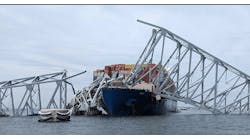I was rushing through my morning paper before work when this headline grabbed me: “Mental Health Can Suffer When Jobless Get a Bad Job.” According to a study published in the Journal of Occupational and Environmental Medicine, the psychosocial quality of work determines whether employment has benefits for mental health. My take-away from this article was, if you're unemployed, you might have a better chance of keeping all your marbles than someone working and miserable.
Just to be clear, the report does say that moving from unemployment into a high quality job led to improved mental health. However the transition from unemployment to a poor quality job was more detrimental to mental health than remaining unemployed. The report's conclusion: “Work of poor psychosocial quality does not bestow the same mental health benefits as employment in jobs with high psychosocial quality.”
We write a lot about the physical dangers of operating poorly maintained lift trucks, working around poorly trained lift truck operators, handling broken pallets, falling off docks, picking up heavy products, etc., etc. I've even heard about the rise of on-the-job bullying and even physical violence. But this study may add another occupational hazard: psychological damage.
After reading about this study, I took another look at the comments MH&L received from respondents to its annual salary survey. I must say, I'm now a little worried about some of your colleagues. Here's what some respondents told us:
“I am so disappointed in the new conveyors, vertical lifts, palletizers and wrappers that we installed this year.”
“I am working towards becoming a professional stock options investor, so I'm not the most enthusiastic about my current career.”
“I would be happier if the people who are in the know would understand what their greed has done to individual lives.”
“Increased responsibilities and duties have stretched manpower thin, making it harder to do the job correctly.”
“Low wages – man's world.”
And finally, the following response to our question “What is the biggest challenge facing the material handling and logistics industry today?”:
“Trying to make a very basic down and dirty industry too complicated.”
I don't know whether that last person was referring to the material handling industry in general or to our magazine in particular, but I think my feelings are hurt. Where's OSHA when you need them?


